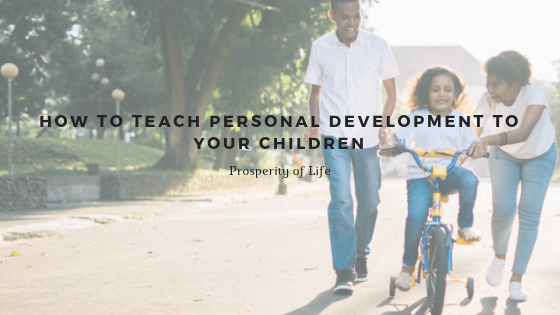There is nothing quite like the joy of watching a child grow. Every new day with a child is a marvel as they learn to walk and talk, develop a sense of humor, and interact with other children. Despite children’s sunny demeanor, they can sometimes feel just as confused and lost as adults do. Understanding personal development doesn’t just improve your life in the present, it also give you the know-how to teach your children the skills they need to grow into confident and self-adjusting adults.
The ways you implement personal development into your own life will probably look a lot different than the way you teach children those same skills. We’ve outlined here the most practical ways you can share personal development practices with your children.
Start with Visualization. This is an easy place to begin because it’s likely that you are already performing the basics of this regularly. Turn bedtime stories into a learning experience that your child will enjoy. Instead of picture books, read from a children’s novel and pause often and ask them how they picture the characters and setting in their mind. As your child’s comprehension grows, ask them how they feel about a character’s decision and how they think it will affect them.
These practices are great for reading comprehension, undoubtedly. But they also function to teach your child the power of visualization from an early age. In doing so, they will be more likely to apply those practices to their own life as they grow. For example, they might ask themselves the risks of deciding to ride their bike in the street or not studying for a test. If they visualize themselves engaging in positive practices, such as studying, they are more likely going to feel positively about the experience they are about to engage in.
Repetition and Affirmations are also key to developing your child’s personal development. Make sure to tell them that they are special and smart. The more they hear those words, the more they will believe them. The key with affirmations though is to not tie them to unhealthy expectations or comparisons.
A child should never feel that they are in competition with a sibling or classmate. Such feelings can be avoided by celebrating each child’s unique choices and skills, and most importantly by reaffirming that those different choices and skills are necessary and important too. One child’s success at sports is just as worthy of celebration of another’s success with academic endeavors. Pride and love should be affirmed and repeated consistently and constantly for positive growth.
Children are respond well to Demonstrations and Habits. If you demonstrate healthy choices and habits, your child will pick on them. If you take a nightly walk, your child will most likely want to join you–let them. This will instill in them healthy habits. If you are debating whether or not to eat healthy or indulge in junk food, have that debate with yourself out loud. This conversation will be picked up by your child, and it will show them the thinking you have behind your choices, so when they go to debate between healthy and unhealthy choices they have your thought process as guidance.
The practices outlined above are small and easy ways to infiltrate personal development into your child’s life. They also reaffirm your personal development, which is important. If you are actively trying to better yourself and life, your child will notice. And children usually want nothing more than to be like their parents.

